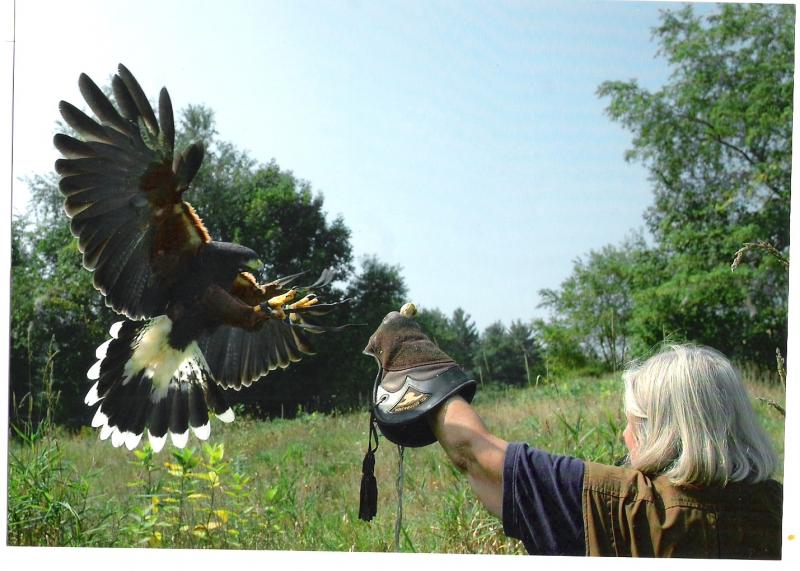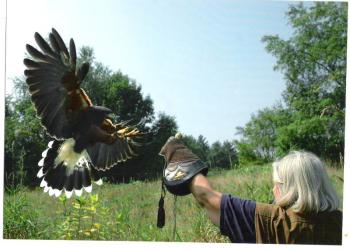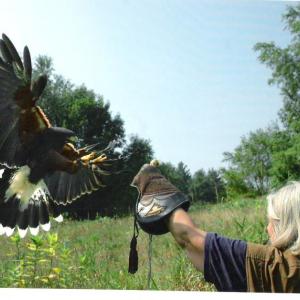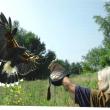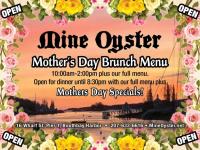Nancy Cowan’s life with raptors
For Nancy Cowan, diving into the world of the formerly aristocratic hunting sport of falconry has been a life-changing event. The author of books and articles on sled dogs, Cowan recently published “Peregrine Spring,” which explores her self-education and fascination with raptors.
She and her husband Jim have a summer residence on Juniper Point in Boothbay Harbor.
Interviewed by telephone from her home in Deering, New Hampshire, Cowan credits Jim, always an animal lover, who returned to his passion for falconry at age 40, with her entry into the sport.
When the couple first decided to get into falconry, then in Londonderry, they soon found out that New Hampshire was one of the few states in which falconry was not a licensed activity.
“It had never come up here,” said Cowan.
With the help of falconers in Maine and Massachusetts, Jim and later Nancy began their apprenticeship and also a three-year campaign to make falconry licensed in New Hampshire.
In the beginning Nancy had no idea how much time and dedication would be required to care for and train a hawk in order to form a “partnership” that would serve both the needs of the human and a wild predatory bird.
In her book, Cowan describes an exhausting three-day process just to get “Injun”, her young Harris’s hawk, to eat from her gloved hand. She relates how Injun instinctively attacked her hand and face early on when his needs were not properly addressed.
As their relationship grew, Cowan writes how the pair learned how to hunt together and even demonstrate the sport to the public
The Cowans eventually moved to Deering, New Hampshire to a 30-acre farm in order to have more space to fly and hunt with their birds. Cowan split her time as the town clerk and tax collector with care and training of her raptors.
Not every effort was a success. In 1999 she trained two peregrine falcons, one of whom had an injured wing and required rehabilitation.
“Every free hour I had was devoted to these peregrines,” she said. From her project came the title for her book.
When they could successfully hunt on their own, they were released only to be killed shortly thereafter. In the book Cowan wrote that rehabilitation birds are purposely not given names other than letters so that their trainer will not become emotionally attached. When she released “N-Z,” she cried all the way back to the car.
“Two days later, “N-Z” was hit by a car while hunting. She still had the morning dove in her talons,” she said. The other peregrine “Witch” was later killed by a red-tailed hawk.
In the book, Cowan relates the results of a survey that concluded that “saving” injured raptors satisfied the desires of the public “but was not of great consequence in terms of maintaining wild populations.”
As the Cowans became known, they were asked to demonstrate their sport to various groups and school classes.
“There is not a 10-to-12-year-old kid that does not want to be a falconer. I own those kids,” said Cowan.
The couple and their hawks were once commissioned for a Hollywood shoot of an insurance commercial filmed on top of a cliff on Cannon Mountain in the New Hampshire White Mountains. The commercial never aired.
The Cowans’ work with school groups and at public gatherings led to the creation of the New Hampshire School of Falconry. The school caters to all ages and levels of experience allowing trained students to fly and even hunt with the Cowans’ raptors, according to the school’s webpage.
Nancy Cowan said that she signed several copies of “Peregrine Spring” at Sherman’s Books and Stationery during a recent visit to Boothbay Harbor. The book was imprinted by Rowman and Littlefield and is distributed by the National Book Network. It is available on Amazon in hardcover and Kindle editions.
Event Date
Address
United States

